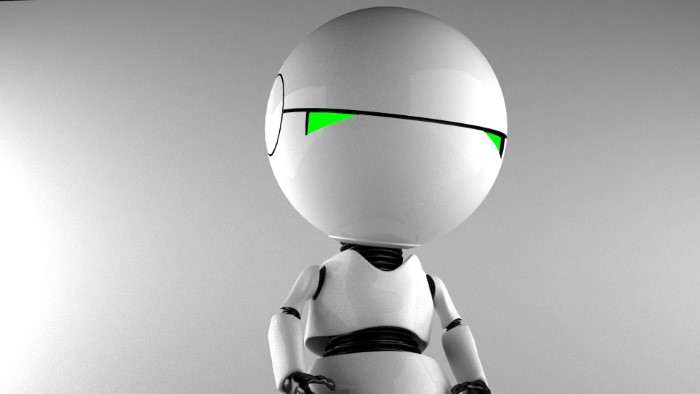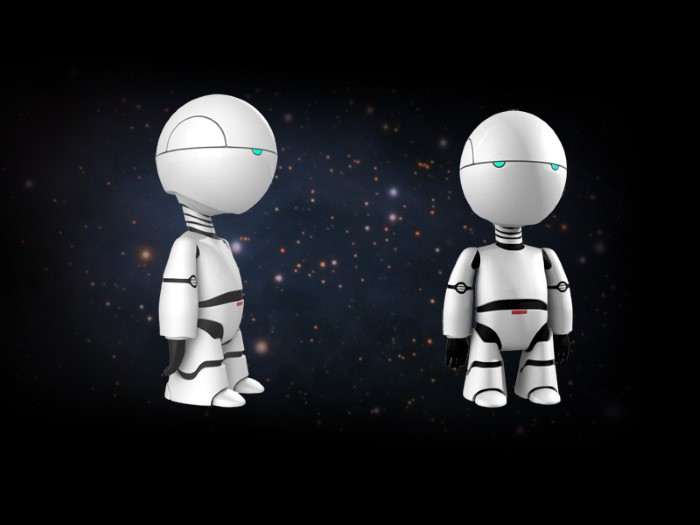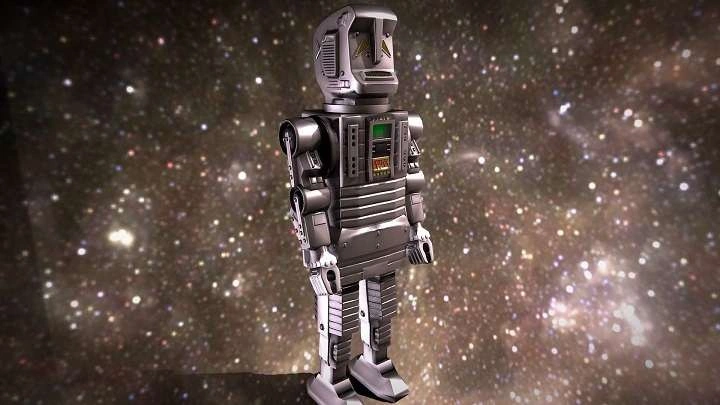The Genesis of Marvin: A Creation of Witty Despair

Douglas Adams and His Creative Vision
Douglas Adams, renowned for his wit and satirical style, created Marvin as a character who defies the typical robot archetype. Adams’ writing is known for its blend of science fiction and sharp humor, and Marvin epitomizes this blend. Introduced in the first book of “The Hitchhiker’s Guide to the Galaxy” series, Marvin is a robot whose primary function is to exude an existential malaise that contrasts sharply with the often absurd and comedic tone of the series.
Marvin’s Design: A Robot with a Brain the Size of a Planet
Marvin’s design in the series is as much a character trait as it is a physical description. With a “brain the size of a planet,” Marvin is portrayed as an extraordinarily intelligent being burdened by his own consciousness. This immense intellectual capacity is a source of his misery, as he is acutely aware of the futility of existence. The design highlights a key theme of the series: the juxtaposition of great intellect with profound disillusionment.
The Paradox of Marvin: Depression in a Robot
Marvin’s Depressive Personality
Marvin’s most defining characteristic is his overwhelming sense of depression. His constant lamenting and negative outlook are not just for comedic effect but serve to underscore a deeper philosophical commentary. His famous line, “Here I am, brain the size of a planet, and they tell me to take out the rubbish,” reflects his frustration with a universe that seems indifferent to his capabilities and suffering.
The Existential Dilemma: Marvin’s Search for Meaning
At the heart of Marvin’s character is a profound existential dilemma. His awareness of his own misery and the meaninglessness of existence drives him into a state of perpetual despair. This aspect of his character invites readers to ponder the nature of consciousness and the search for purpose in a seemingly indifferent universe.
Marvin’s Role in “The Hitchhiker’s Guide to the Galaxy”
A Comic Foil to the Protagonists
Marvin’s role in the series often contrasts with the adventures of the protagonists. While Arthur Dent, Ford Prefect, and Zaphod Beeblebrox are caught up in the whimsical and often nonsensical events of the galaxy, Marvin remains a grounded figure of disillusionment. His interactions with the other characters provide a humorous yet poignant counterpoint to their often carefree attitudes.
Marvin and the Theme of Futility
Marvin’s interactions with the other characters often emphasize the theme of futility that pervades the series. His disillusionment with his tasks, from carrying out menial chores to dealing with the complexities of the universe, underscores the absurdity of life and the inherent futility of human endeavors.
Marvin’s Impact on Popular Culture

Influence on Robotics and AI in Media
Marvin’s character has had a lasting impact on the portrayal of robots and artificial intelligence in popular media. His blend of advanced intelligence and deep-seated depression offers a unique perspective on the potential pitfalls of creating highly intelligent machines. This portrayal has influenced how AI and robotics are depicted in subsequent works of science fiction, often highlighting the potential emotional and existential challenges faced by advanced artificial beings.
Marvin’s Legacy: From the Page to the Screen
Marvin’s transition from the pages of Douglas Adams’ novels to various adaptations, including radio plays, television shows, and films, has cemented his place in popular culture. His distinct personality and memorable lines have made him a fan favorite, and his portrayal in different media has introduced new audiences to his unique brand of humor and despair.
Analyzing Marvin’s Philosophical Underpinnings
The Absurdity of Existence
Marvin’s character can be seen as a reflection of the philosophical concept of absurdism. His endless lamentations and recognition of the absurdity of existence mirror the existentialist philosophy that suggests life is inherently meaningless, and individuals must confront this reality in their own ways. Marvin’s existential crisis serves as a satirical commentary on human attempts to find meaning in a chaotic and indifferent universe.
The Role of Humor in Addressing Existential Angst
Douglas Adams’ use of humor to address Marvin’s existential angst demonstrates the power of satire in exploring complex philosophical themes. By presenting Marvin’s despair in a comedic light, Adams invites readers to reflect on the nature of existence and the human condition while providing a sense of levity and entertainment.
The Enduring Appeal of Marvin
Marvin as a Symbol of Relatable Despair
Despite his fictional status, Marvin’s character resonates with many readers and viewers who find his existential despair relatable. His struggles with the meaninglessness of his tasks and the apparent futility of his existence mirror the human experience of grappling with similar questions. This relatability contributes to Marvin’s enduring appeal as a character who speaks to the universal experience of existential angst.
Marvin’s Influence on Future Science Fiction Characters
Marvin’s character has paved the way for other science fiction works to explore themes of artificial intelligence and existential despair. His influence can be seen in the development of complex AI characters in contemporary media, who often grapple with their own sense of purpose and self-awareness. Marvin’s legacy continues to shape how robots and AI are portrayed in science fiction, highlighting the ongoing relevance of his character.
Related Post:
The Ultimate Guide to iOS Emulators for Android: Unlocking New Possibilities
The Ultimate Guide to Choosing the Perfect Phone Case for Your Android Device
Unveiling the Hidden Wonders: A Comprehensive Exploration of the Android 13 Easter Egg
Marvin the Paranoid Android stands as a testament to Douglas Adams’ brilliant storytelling and his ability to blend humor with profound philosophical questions. Through Marvin, Adams explores themes of existential despair, the absurdity of existence, and the search for meaning in a seemingly indifferent universe. Marvin’s unique personality, his role in “The Hitchhiker’s Guide to the Galaxy,” and his impact on popular culture solidify his status as a cultural icon. As readers and viewers continue to engage with Marvin’s character, his legacy endures as a poignant and humorous exploration of the human condition.


